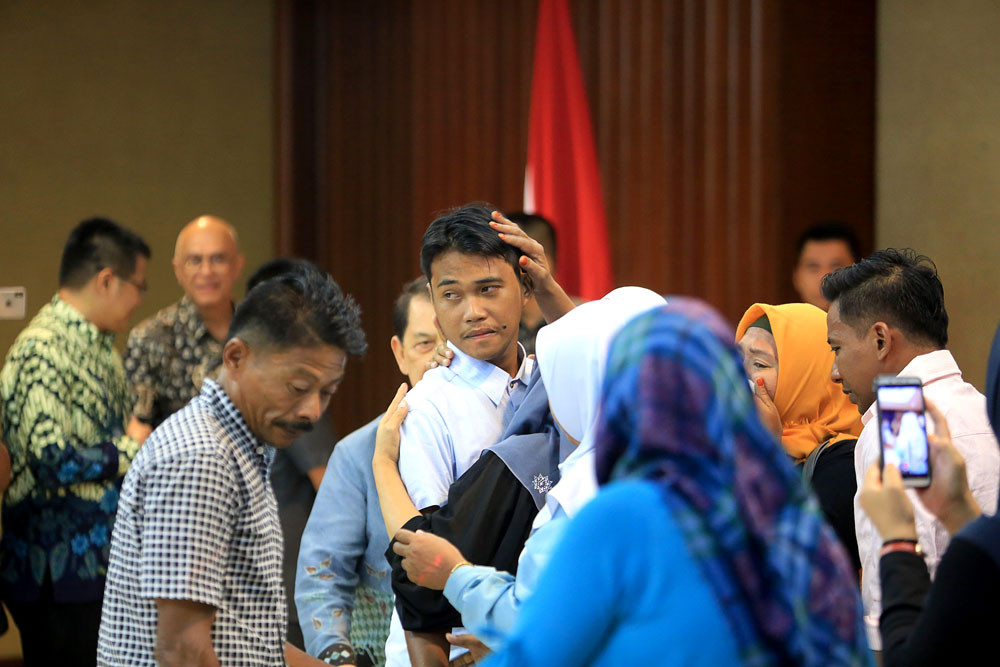Popular Reads
Top Results
Can't find what you're looking for?
View all search resultsPopular Reads
Top Results
Can't find what you're looking for?
View all search resultsLast RI survivor returns despite losing friend in liberation from Abu Sayyaf
The last remaining Indonesian hostage of the Philippine-based Abu Sayyaf armed group returned home this week, but not without tragedy.
Change text size
Gift Premium Articles
to Anyone
 Heri Ardiansyah, 18, (center), who had been held hostage by Abu Sayyaf militants in the Southern Philippines, is embraced by his relatives after the Foreign Ministry officially returned him to his family at a ceremony in Jakarta on Thursday. During the ceremony, Foreign Minister Retno LP Marsudi handed over Heri and the body of Hariadin, 45, another Indonesian taken hostage but who died after fleeing a clash between security authorities and the militants, to their families.
(The Jakarta Post/Seto Wardhana.)
Heri Ardiansyah, 18, (center), who had been held hostage by Abu Sayyaf militants in the Southern Philippines, is embraced by his relatives after the Foreign Ministry officially returned him to his family at a ceremony in Jakarta on Thursday. During the ceremony, Foreign Minister Retno LP Marsudi handed over Heri and the body of Hariadin, 45, another Indonesian taken hostage but who died after fleeing a clash between security authorities and the militants, to their families.
(The Jakarta Post/Seto Wardhana.)
H
eri Ardiansyah, an Indonesian fisherman recently freed from months of abduction by a notorious Philippines-based armed group, was unable to stay composed as his glance fell on the blue hijab-wearing woman approaching him.
There was a lull in the crowd of onlookers just before Heri made his devastation clear.
“I am sorry, Bu. I really am sorry,” said the 18-year-old man in a quavering voice, during a ceremonial affair at the Foreign Ministry complex in Jakarta this week.
This woman, alongside a few other people assembling around Heri – including Foreign Minister Retno LP Marsudi – burst into tears as they hugged him in turn.
Nurhaida was the wife of Heri’s friend, 45-year-old Hariadin, who along with him and Malaysian national Jari Abdullah was abducted on Dec. 5 last year by the Abu Sayyaf group as they sailed through the Kinabatangan River in Sandakan, Malaysia – just a short distance from the Philippines’ Tawi-Tawi islands.
Heri and Hariadin resolved to escape the clutches of their captors when last Thursday, clashes erupted between the armed group and Philippine security forces around Simisa Island in the southern island chain of Sulu.
They swam away, initially aiming to reach the nearest islet, Bangalao, but were only found in the water 22 hours later by Philippine officials.
Heri was rescued, but his friend did not make it alive, having drowned in their escape attempt.
Malaysian national Jari, who was airlifted for his gunshot wounds after the clash, also perished.
Heri and the late Hariadin were the last two Indonesian hostages to have been held by the Abu Sayyaf group.
Indonesia’s coastal fishermen had been easy targets for the group since 2016. In March of that year, 10 Indonesians were abducted near the border area, and in response to that, Jakarta initiated what eventually became the INDOMALPHI trilateral maritime patrols.
The patrol, aimed at maintaining security in the Sulu-Sulawesi waters, started out successfully but after a 21-month stretch of calm, two Indonesian fishermen were kidnapped near Malaysia’s Gaya Island off the east coast of Sabah on Sept. 11, 2018.
Within that three-year period, a total of 36 Indonesian fishermen were kidnapped by the Abu Sayyaf group and its various splinter cells. Of that figure, all but one was safely rescued.
At Thursday’s event, minister Retno symbolically handed over Heri and Hariadin’s remains to their respective families and called on Indonesian fishermen to be wary of the Sulu waters, where the abduction of foreign seamen still occurs.
"The activities of armed groups in the southern Philippines still continue. Because of this, Indonesia, the Philippines and Malaysia continue to carry out trilateral cooperation to maintain security in the Sulu waters and its surroundings," she said.
Earlier this year, during her annual press statement, Retno conceded that the flurry of kidnappings in the Sulu region was one of the main challenges facing Southeast Asian nations.
Deka Anwar, an analyst with the Jakarta-based Institute for Policy Analysis of Conflict (IPAC), said the three countries must involve other maritime law enforcement agencies to ensure the security of the Sulu-Sulawesi seas, as the role remains exclusively held by military forces.
He said agencies like the water police unit (Polair), the coast guard and port security had yet to be involved.
“In particular, regarding the Abu Sayyaf group, inter-police cooperation must be strengthened, especially in sharing information regarding the investigation of the group’s caught members to systematically understand the kidnap-for-ransom network in the Sulu archipelago and Sabah,” he told The Jakarta Post recently.
Earlier this year, IPAC released a report in which it called on countries to go beyond military solutions in maintaining peace and stability in the waters.
To address both kidnapping and terrorism, it said, the related parties should work on “good intelligence” by, among other things, arresting kidnappers alive and debriefing them as they are hoped to reveal information about networks and syndicates.









